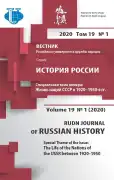‘Stalinist Russocentrism’: An Interview with David Brandenberger about the Second Russian Edition of his Monograph National Bolshevism: Stalinist Mass Culture and the Formation of Modern Russian National Identity, 1931-1956 (Cambridge, Mass.: Harvard University Press, 2002. viii, 378 p.)
- Autores: Brandenberger D.1,2
-
Afiliações:
- University of Richmond
- National Research University “Higher School of Economics”
- Edição: Volume 19, Nº 1 (2020): THE LIFE OF THE NATIONS OF THE USSR BETWEEN 1920-1950
- Páginas: 214-239
- Seção: SCHOLARLY LIFE
- URL: https://journal-vniispk.ru/2312-8674/article/view/321859
- DOI: https://doi.org/10.22363/2312-8674-2020-19-1-214-239
- ID: 321859
Citar
Texto integral
Resumo
David Brandenberger holds a doctorate in history (PhD.) and is professor of Russian and Soviet history in the Department of History at the University of Richmond (USA). He is also an associate researcher at the National Research University “Higher School of Economics” in Moscow. He is the author of books on the formation of Russian national identity during the Stalin era and on the infl uence that party propaganda and mass culture had on that process. In this interview, David Brandenberger discusses the arguments and methodologies that contributed to his monograph that was initially published in English and then in two Russian editions: National Bolshevism: Stalinist Mass Culture and the Formation of Modern Russian National Identity, 1931-1956 (Cambridge: Harvard University Press, 2002), Natsional-bol’shevizm: stalinskaya massovaya kul’tura i formirovaniye russkogo natsional’nogo samosoznaniya, 1931-1956 gg. (St Petersburg: Akademicheskiy proekt, 2009) и Stalinskiy russotsentrizm: Sovetskaya massovaya kul’tura i formirovaniye russkogo natsional’nogo samosoznaniya, 1931-1956 gg . (Moscow: ROSSPEN, 2017). Among other things, the author discusses how his thoughts on the topic of this book have evolved since its fi rst publication in light of scholarly debate and the increased availability of primary and secondary sources.
Sobre autores
David Brandenberger
University of Richmond; National Research University “Higher School of Economics”
Autor responsável pela correspondência
Email: rushistj@rudn.ru
PhD in History, Professor of Russian and Soviet History in the Department of History, University of Richmond; research associate, National Research University “Higher School of Economics” (Moscow, Russian Federation).
Bibliografia
- Anderson B. Imagined Communities: Refl ections on the Spread of Nationalism. New York: Verso, 1991.
- Artizov, A.N. “V ugodu vzglyadam vozhdya. Konkurs 1936 g. na uchebnik po istorii SSSR.” Kentavr, no. 1 (1991): 125–135 (in Russian).
- Brandenberger, D. “The ‘Short Course’ to Modernity: Stalinist History Textbooks, Mass Culture and the Formation of Popular Russian National Identity, 1934–1956.” PhD diss., Harvard University, 1999.
- Brandenberger, D.L., and Dubrovsky, A.M. “ ‘The People Need a Tsar’: The Emergence of National Bolshevism as Stalinist Ideology, 1931–1941.” Europe Asia Studies 50, no. 5 (1998): 873–892.
- Brandenberger, D. Propaganda State in Crisis: Soviet Ideology, Indoctrination and Terror under Stalin, 1928–1941. New Haven: Yale University Press, 2011.
- Brandenberger, D., and Zelenov, M. Stalin’s Master Narrative: A Critical Edition of the Short Course on the History of the Communist Party (Bolsheviks). New Haven: Yale University Press, 2019.
- Brandenberger, D. “Stalin, the Leningrad Aff air, and the Limits of Postwar Russocentrism.” Russian Review 63, no. 2 (2004): 241–255.
- Brandenberger, D. “‘Simplistic, Pseudo-Socialist Racism’: Ideological Debates Over the Direction of Soviet Socialism within Stalin’s Creative Intelligentsia, 1936–1939.” Kritika: Explorations in Russian and Eurasian History 13, no. 2 (2012): 365–393.
- Brandenberger, D. Krizis stalinskogo agitpropa: Propaganda, politprosveshcheniye i terror, 1927–1941. Moscow: ROSSPEN Publ., 2017 (in Russian).
- Brooks, J. When Russia Learned to Read: Literacy and Popular Literature, 1861–1917. Evanston: Northwestern University Press, 2003.
- Gellner, E. Nations and Nationalism. Ithaca, 1983.
- Geldern, J. von, and Stites, R. Mass Culture in Soviet Russia. Bloomington: Indiana University Press, 1995.
- Hroch, M. The Social Preconditions for a Rational Revival in Europe: A Comparative Analysis of the National Composition of Patriotic Groups Among the Smaller European Nations. Cambridge: Cambridge University Press, 1985.
- Hroch, M. “From National Movement to the Fully-formed Nation: The Nation-building Process in Europe.” In Mapping the Nation, 78–97. New York; London: Verso, 1996.
- King, D. The Commissar Vanishes: The Falsifi cation of Photographs and Art in Stalin’s Russia. New York: Henry Holt and Company, 1997.
- Lenoe, M. Closer to the Masses Stalinist Culture, Social Revolution, and Soviet Newspapers. Cambridge: Harvard University Press, 2004.
- Martin, T. The Affi rmative Action Empire: Nations and Nationalism in the Soviet Union, 1923–1939. Ithaca: Cornell University Press, 2001.
- Menkovskiy, V. “Retsenziya na «Krizis stalinskogo agitpropa.” Ab Imperio, no. 4 (2018): 380–389 (in Russia).
- Ree, E. van. “Heroes and Merchants: Stalin’s Understanding of National Character.” Kritika: Explorations in Russian and Eurasian History 8, no. 1 (2007): 41–65.
- Shestakov, A.V. Istoriya SSSR: Kratkiy kurs. Moscow: Gosudarstvennoye uchebno-pedagogicheskoye izdaniye, 1937 (in Russian).
- Suny, R.G. The Revenge of the Past: Nationalism, Revolution, and the Collapse of the Soviet Union. Stanford: Stanford University Press, 1993.
- Weiner, A. Making Sense of War: The Second World War and the Fate of the Bolshevik Revolution. Princeton: Princeton University Press, 2001.
- Yekelchyk, S. Stalin’s Empire of Memory: Russian-Ukrainian Relations in the Soviet Historical Imagination. Toronto: University of Toronto Press, 2004.
Arquivos suplementares









